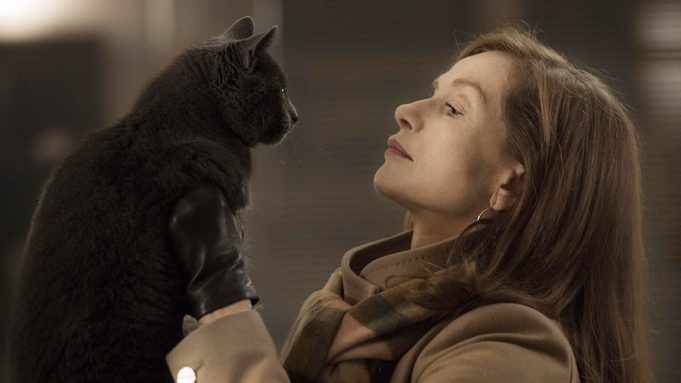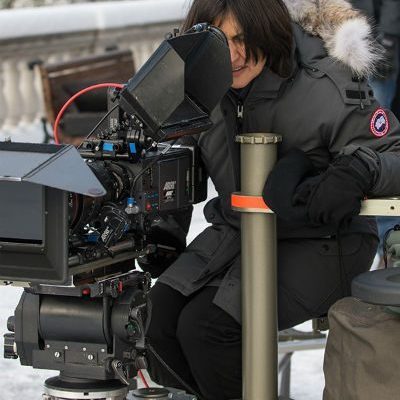
The French screen icon Isabelle Huppert stars in a confronting new thriller ‘Elle’
Not long after she is brutally raped by a masked man in her luxurious townhouse, Michèle Leblanc (Isabelle Huppert) luxuriates in a bubble bath. As she lies there, a heart-shaped cloud of blood slowly rises to the surface of the water between her legs.
It is this image that provides the key to the French language feature Elle—a film that is at once terrifying, hilarious, stomach-churning—and possibly one of the most compelling films I’ve seen invoking rape and its sometimes requisite narratives of victimhood and vengeance.
I saw Elle at the 54th New York Film Festival in October, which is where I also saw Isabelle Huppert speak thoughtfully and intelligently about the film after its screening—and I’ve been thinking about it ever since. While watching the film I alternated between marvelling at Huppert’s impeccable and visceral performance and drawing my sweater up over my eyes so I would not be assaulted by the intermittent bursts of violence, sexual and otherwise.
I am a lifelong fan of Huppert, who many consider being one of the world’s greatest living actors. But I am not as enthusiastic a fan of the director Paul Verhoeven. I’ve seen Basic Instinct and Showgirls and I enjoyed parts of them.
Who can forget Sharon Stone uncrossing and re-crossing her legs, showing a shadowy slice of killer pussy for a split second? Even watching Gina Gershon strut around in the ridiculous Showgirls was a guilty pleasure. But were these staged spectacles of female eroticism ever anything more than a straight man’s fetish—the convoluted deferment of desire for unattainable women?
I’d relegated watching Verhoeven’s films to the ’90s—and that era of lesbian chic which meant a kind of retro-infatuation with femme Fatales that embodied the glamorous and unattainable woman. So why am I there again? What is it that we—me, you, and the culture—have not solved about women and their legitimate access to power, sexual or otherwise?
Why are we still unable to balance their erotic allure with their actual agency? Why must I sit through a film, albeit very well-made, in which one of my favourite female screen icons is raped, not once, but several times?
It occurred to me that Verhoeven might be as angry as I am about our culture’s determination to cast women in the role of victim, to enact violence upon them as a substitute for consensual desire. But Elle is no stock-in-trade ‘woman is raped, the woman suffers, seeks revenge, gets gun and goes and blows rapist’s head off’ Hollywood B-grade flick.
No. That doesn’t happen in Elle, even though the film’s trailer makes you think it might.
What happens is more elusive, like a Mobius Strip. After Michèle Leblanc is raped, her life is not broken nor does it stop. It continues seamlessly, with an order of sushi, a champagne dinner with friends, power plays at the office, and an affair with her best friend’s husband. Almost as an afterthought, she orchestrates to expose her attacker.
It is important to note that Isabelle Huppert does not play a rape victim in Elle. But she does play one hell of a femme fatale, with her pursuit of weapons, her impeccable hair, her noir-ish wardrobe…and her black cat (it’s the comings and goings of this ambiguous feline that let the rapist in). This ambitious, controlled, emotionless perfectionist is, as her name suggests, a blank slate; an enigma.
What might she be capable of? Her ex-husband says, “The real danger, Michèle, is you.” But not really. Verhoeven is a provocateur who enjoys toying with women, in a similar way that a cat plays with a mouse. The mouse is only incidentally a casualty of its playing; it is also a tribute.
Because Elle is no way answers a question that many of us want to be answered: Why do some men rape women? Because the film turns out to not be about rape at all; rather, it is about kink and consent. And one thing suggested by the film is that consent is not absolute; it is prismatic, a process of negotiation, and the rules around it need to be explained psychologically.
The film’s naked portrayal of the sometimes revolting mechanics of heterosexuality made me breathe a sigh of relief that I’m a lesbian. But my sexuality is marginal if not ridiculous alternative for the Michèle Leblancs of this world.
In one scene, Michèle and her best friend, exhausted by the stupidity of the men around them, are lying in bed together and consider making their deep affection for each other physical—before breaking into giggles. Because being a lesbian would let woman—‘Elle,’ she—out of the mousetrap.
In Verhoeven’s eyes, and in the culture at large, lesbianism is not a viable alternative, because then men can’t play.
So, I want to say here that if this film is good enough for Isabelle Huppert, it is good enough for me. Because speaking at the press conference she revealed that the film was both for her and for her. She was especially drawn to the project as an opportunity to play a character we have not seen before.
Michèle is a powerful female CEO of a software company that manufactures images of violence — often against women. Her ambition and her intelligence override her emotion or any feminine sense of propriety. In spite of her gender and her diminutive physique, she is intent on doing what she wants.
“She’s a new type of woman, and I thought that was exciting to give life to her,” said Huppert to the screening audience of The 54th New York Film Festival. Huppert is receiving accolades for what is surely the command performance of her career, but what you think of her character and the actions she takes is up to you.
What becomes clear is that Michèle is a product not only of her own determination but of male failure; her father is a mass murderer, her former husband is unsuccessful, her male employees are scurrilous and resentful. Her rape is not so much an assault that affirms the powerlessness of ‘Elle.’ Rather, it exposes the powerlessness of men. And that is perhaps something we have not seen before.



